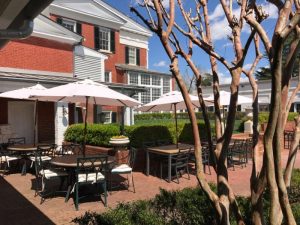
In 1951, a tissue sample was taken from a poor, dying black woman without her consent. These cells were unlike anything the doctor had previously seen – they doubled at an astounding rate, but even more significantly, they did not die. Cultivation of the cells revolutionized modern medicine, being used to combat polio, cancer, HIV, and most recently, COVID-19. Named after the patient from which the sample was taken, Henrietta Lacks, the origin of the “Hela” cells remained a secret for decades. It wasn’t until a journalist published her findings that the world discovered her story.
Born in Roanoke, Virginia, Henrietta grew up with her grandfather after the death of her mother. They lived in a four-room log cabin in the Clover community of Halifax County. It was here that Henrietta spent much of her childhood, pulling tobacco and tending to livestock and the garden. During harvest, she would travel to South Boston alongside her grandfather to sell their crop. Like many of her brothers, sisters, and cousins, Henrietta eventually dropped out of school to work the tobacco fields.
At age 14 she had her first child by her future husband, Day Lacks. They had a second child before marrying at a private ceremony on April 10, 1941. By winter, the country was at war, and small tobacco farms were struggling to make ends meet. Demand for steel was increasing, so Day and Henrietta moved their family to Turner Station, Maryland, where Day worked in a factory. The Lacks family embraced the change from country life to city life. Henrietta would often go out dancing with her cousin after the babies had been put to sleep for the night. However, a country girl at heart, Henrietta would often take the train back to Clover to work the fields and see family when she had time. It was also in the country that her special needs daughter, Elsie, felt most at ease.
Before her official diagnosis, Henrietta was convinced something was wrong. Soon after she discovered she was pregnant, and family insisted the baby was making her feel off. After giving birth Henrietta still felt something was wrong and found a knot. Upon this discovery, she sought treatment at Johns Hopkins. There Howard Jones, her doctor, found the tumor where she described it and took a biopsy. Having just carried a baby to term, he found it odd there was no mention of it on her medical charts, suggesting the tumor must have grown at an alarming rate. Testing confirmed she had cervical cancer.
At the time, it was common practice to research public ward patients without permission, and as such, no legal or ethical standard required obtaining consent. Jones’ boss believed that, since patients were being treated for free, research was a form of payment to the hospital. The sample from Henrietta was sent to a cancer researcher at Johns Hopkins, where it was discovered the HeLa cells continued to make copies of themselves. When word got around in the scientific community, the cells were sent to labs across the country and the world.
Henrietta continued to visit the hospital for treatment. A caring woman, she only told a few close friends about her diagnosis because she didn’t want people to worry. Treatments at the time often had painful side effects, but Henrietta remained strong. However, cancer spread throughout her body causing agonizing pain. On October 4, 1951, Henrietta Lacks passed away with her sister by her side. Her body was returned to Clover, where she was buried in an unmarked grave next to her mother.
After her death, the cells continued to replicate and be distributed. They’ve been used for vaccines, gene mapping, cancer research, tested against an atomic bomb, and even been sent to space. Only a handful of people knew the origin of the HeLa line, and her name wasn’t released until the 1970s.
All the while the Lacks family had no idea her cells were still alive. The discovery caused anger, pain, and confusion. Scientists had made fortunes on medical breakthroughs using Henrietta’s cells, while her family couldn’t afford health insurance. The hospital argued it had not made a profit off the HeLa line and had not violated any laws. It wasn’t until a 2010 best-seller published by Rebecca Skloot and subsequent movie starring Oprah Winfrey propelled Henrietta’s story into mainstream consciousness.
Today, those who remember Henrietta remember her as a compassionate caregiver and a strong woman. Her family finds solace in the worldwide impact she’s had, and that she’s finally receiving the recognition she deserved. Though the past cannot be changed, family members now sit on a board alongside medical experts to approve the use of her cells. In 2010, a headstone was donated to the Lacks family to mark her grave. To end on the words of her grandchildren:
Henrietta Lacks, August 1, 1920 – October 4, 1951
In loving memory of a phenomenal woman,
wife and mother who touched the lives of many.
Here lies Henrietta Lacks (HeLa). Her immortal
cells will continue to help mankind forever.
Eternal Love and Admiration, From Your Family



